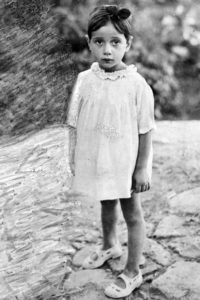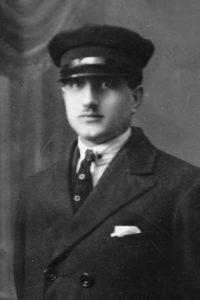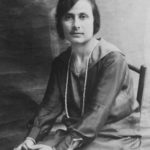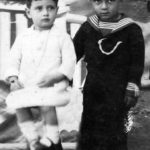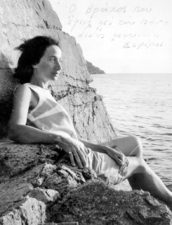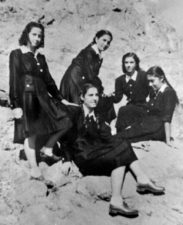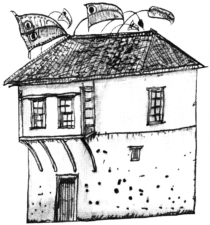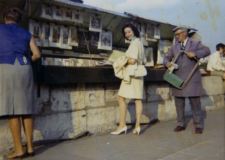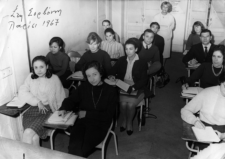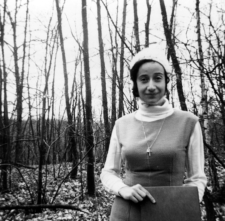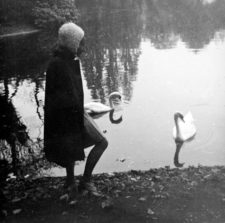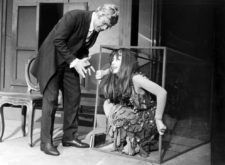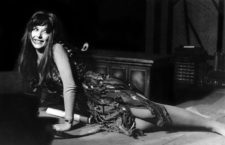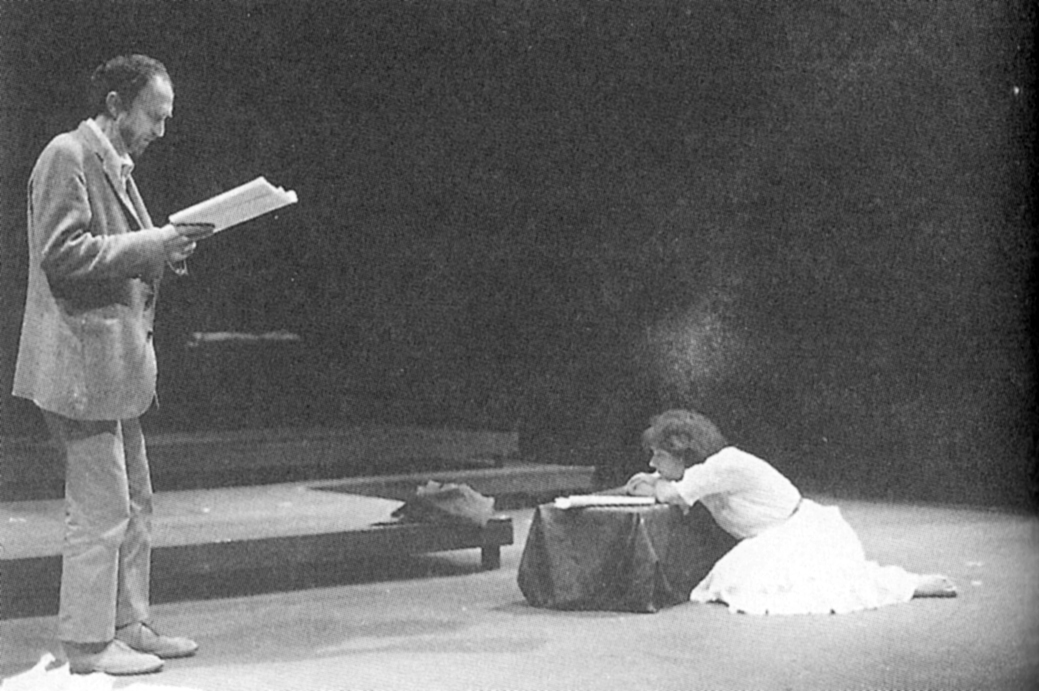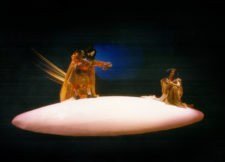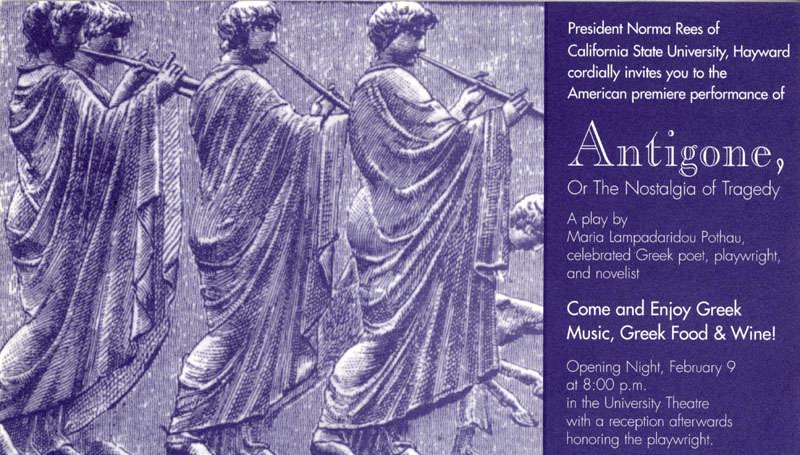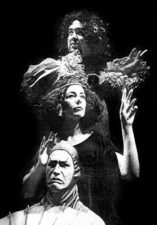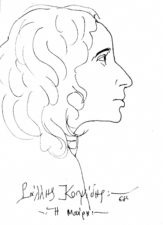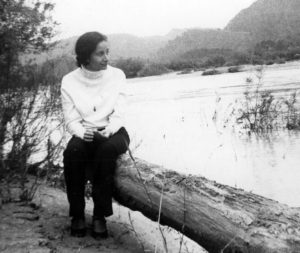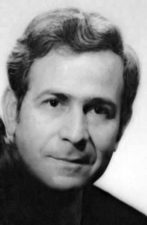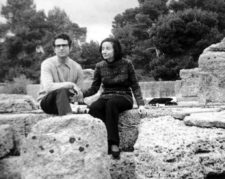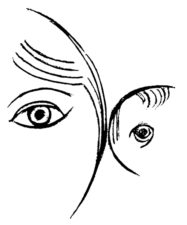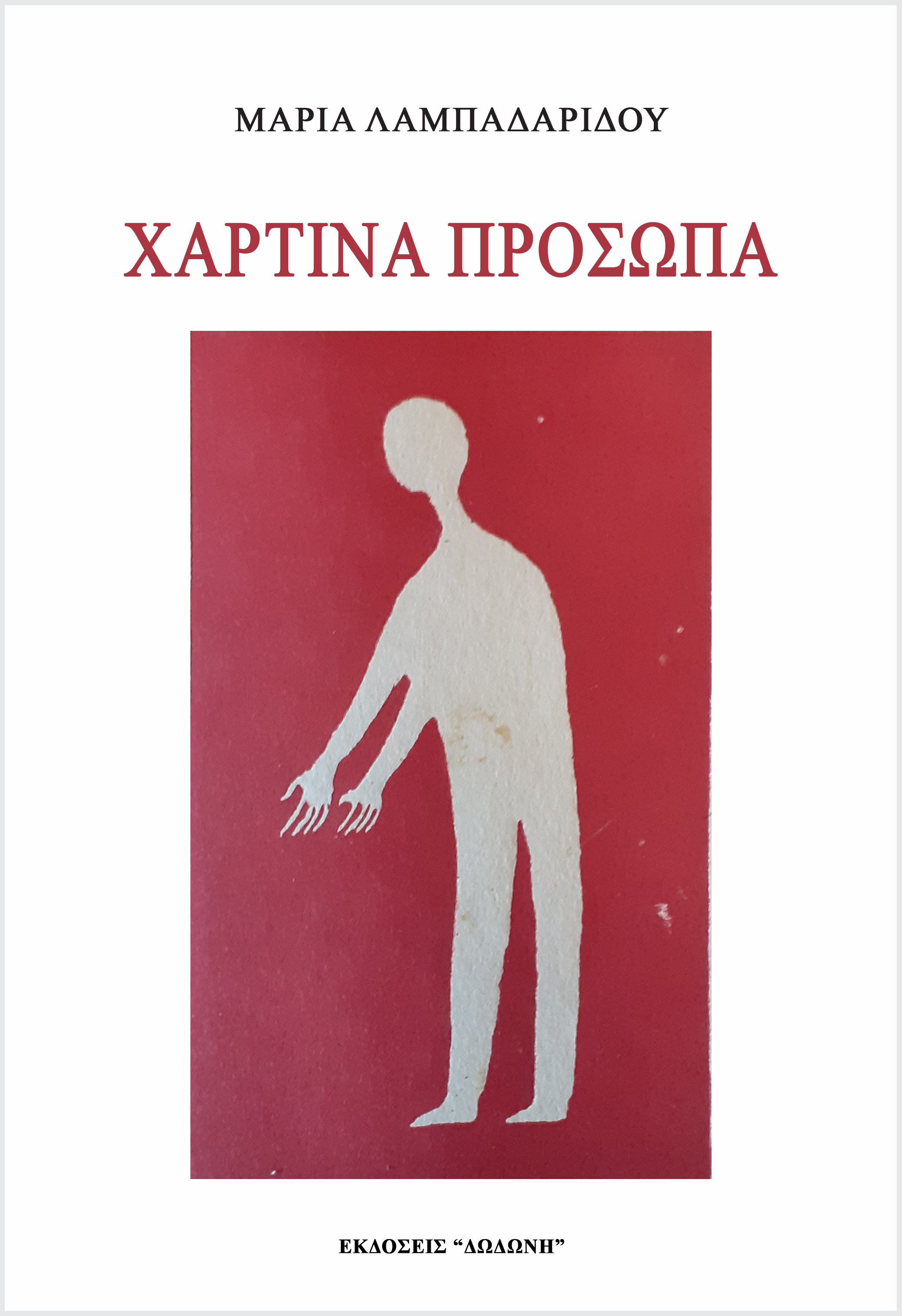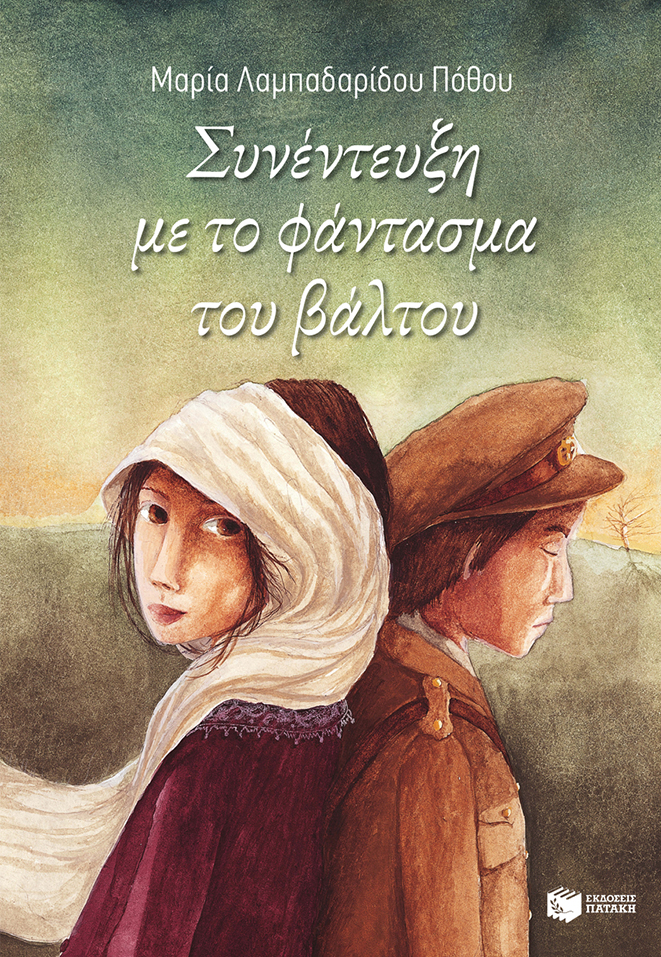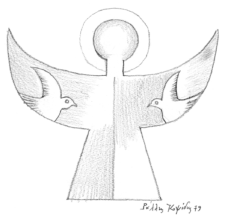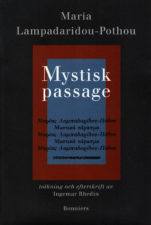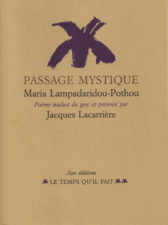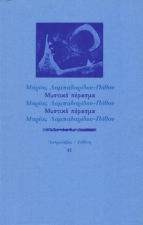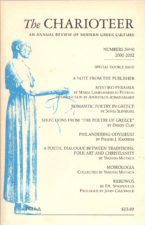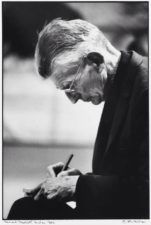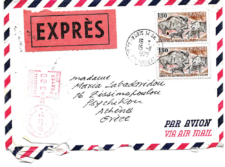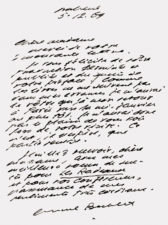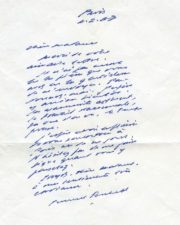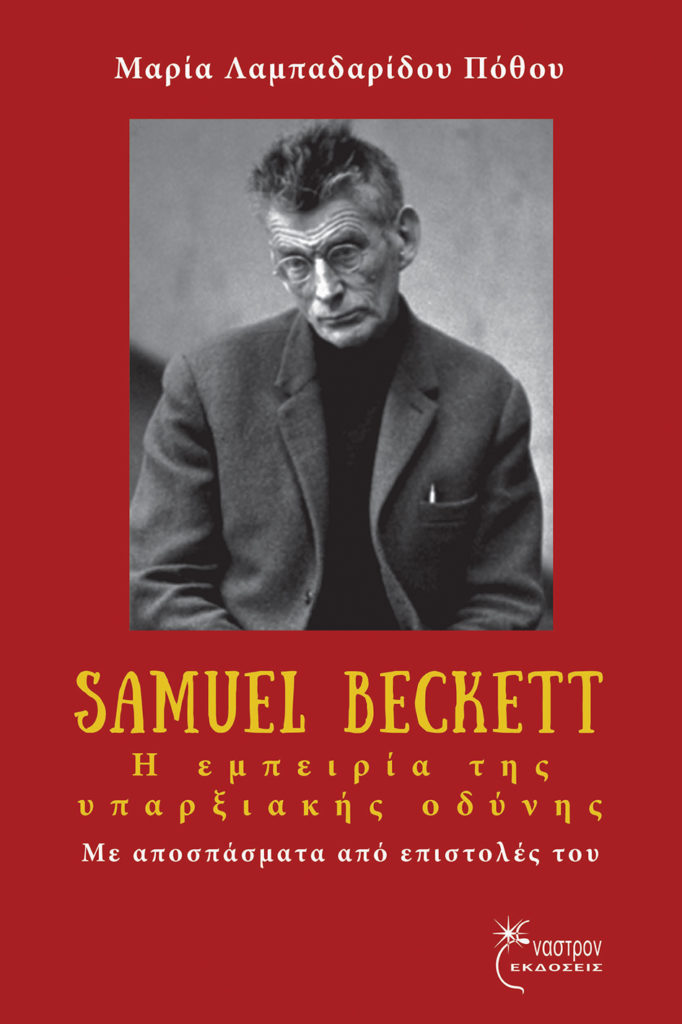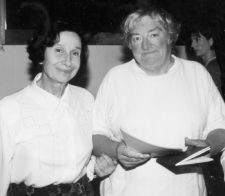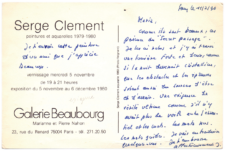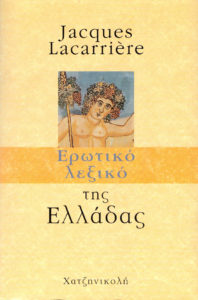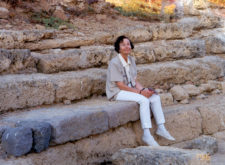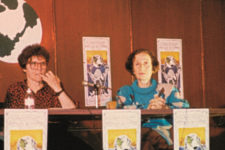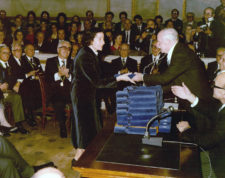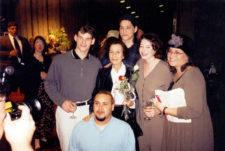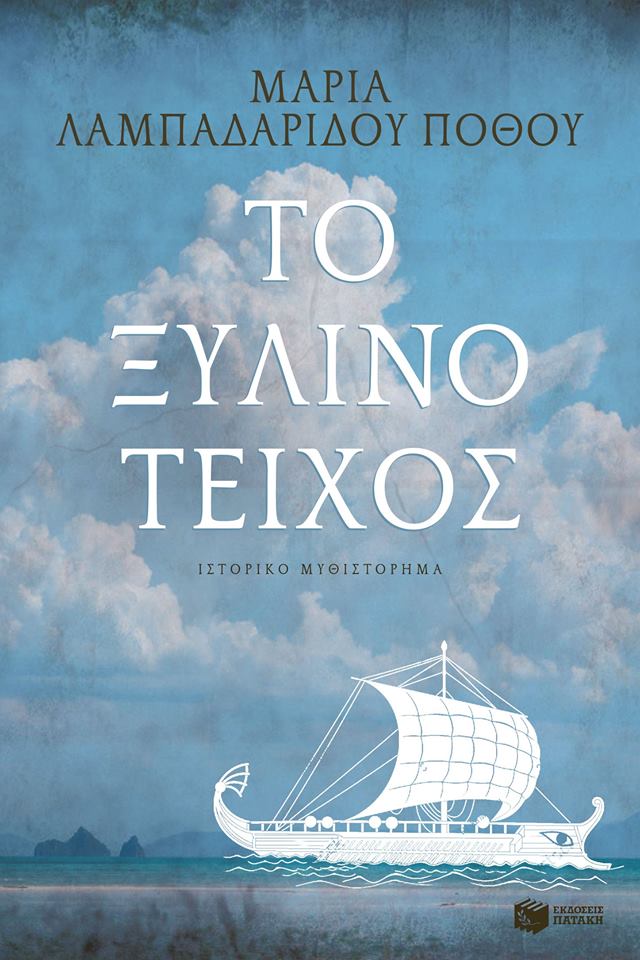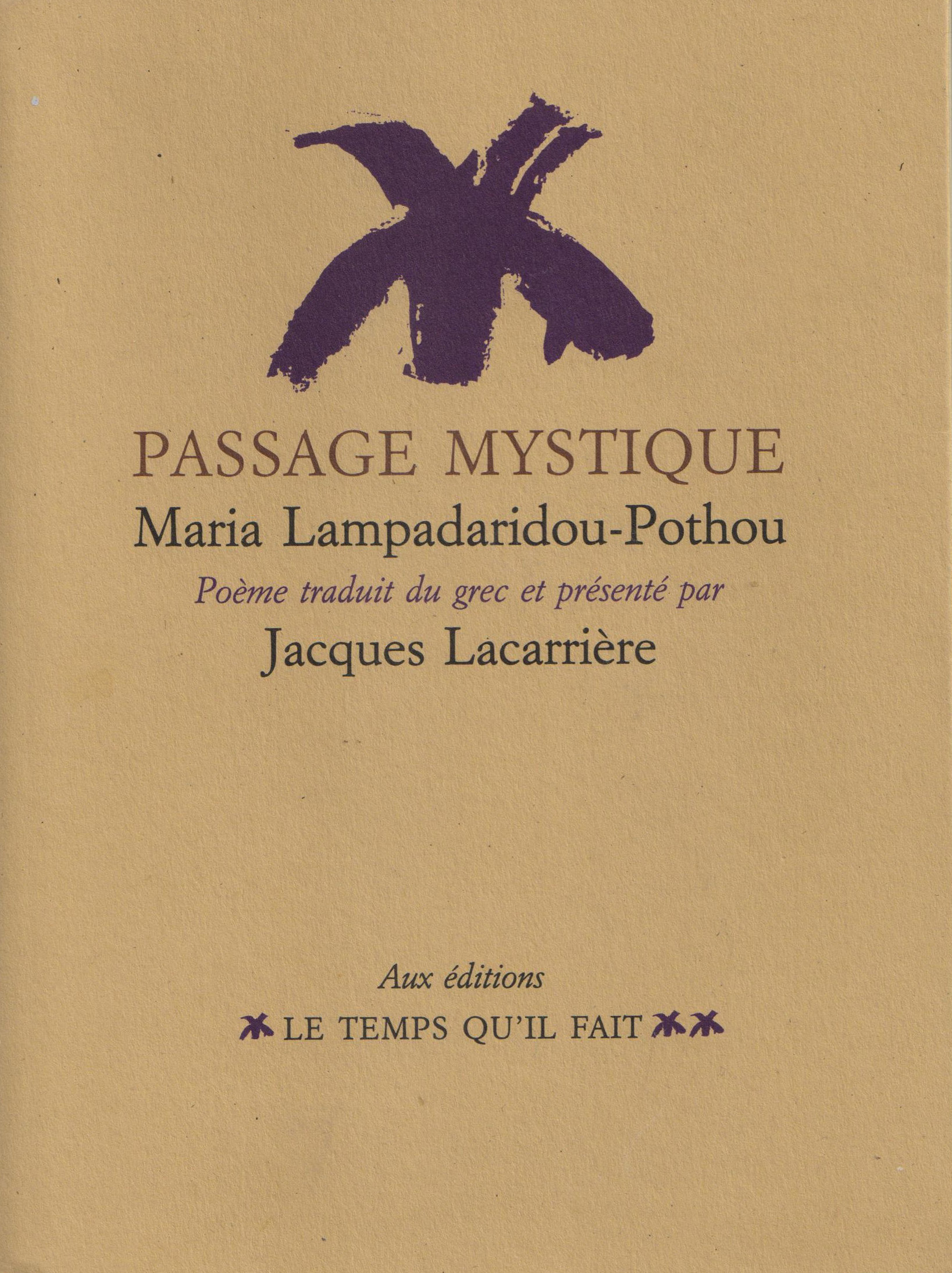
“Just as we sometimes dream that something eventful is happening outside our home, and we must hurry, but in our dream, we are unable to tie the cord of our shoe or button up our clothes, and because of this unimportant detail we know that we miss something significant, we miss the stirring event that takes place outside our home, somewhere outside our lives, in that other reality that baffles us, that continuously slips away and disappears, just like that essential thing, which constitutes the meaning and the truth of our lives, and the agony is intense. I have lived in a similar agony as a writer and as a human being".
Early years
She was born in Lemnos, an island in the northern part of the Aegean in Greece. As a child during the German occupation in Lemnos she experienced firsthand the absurdity of such a ruthless human extermination. Due to the fact that the island was isolated there weren't any bookstores. Every two weeks a boat from the mainland would arrive with newspapers and other goods. Her parents were poor but appreciated culture. Her mother was a local Lemnian who lived by traditional principles. Her father was a refugee from Asia Minor. He was still a child when he was exiled and remained forever nostalgic of his lost home and the pain of that loss was passed on his children. In all his life on the island he was a cantor for his town's church and also kept a small store where he made and sold decorative reigns for livestock. Maria fondly remembers him writing down on his ledgers psalms and quotes of his favorite ancient philosophers such as Plato and Aristotle. In the long winter nights, instead of fairy tales, her father would read to her and her brother psalms and byzantine ecclesiastical poetry. Maria, as a writer, later in interviews always acknowledged the fact that her first initiation to great poetry were those psalms.
When she finished her elementary studies in Lemnos, she was appointed as a clerk to the Provincial court of the island by written exams. While she worked, she gave exams for the Panteion University in order to complete a degree by distant learning. In 1963 she received her degree and two years later she was granted a fellowship from the French Government to study Theatre at the Sorbonne University, Paris.
Paris
In September 1966 she traveled to Paris and settled at a student residence located in the Latin Quarter. While she was there, she was introduced to the modern movements of Western philosophy, such as nihilism and the Absurd Theatre, as well as writers of existential agony, such as Albert Camus, Kafka, Samuel Beckett. The work of Beckett, especially, had a profound effect on her. Later in Greece, she translated some of his plays into Greek and reviewed his work. During her studies in Paris, she also wrote two poetic plays which belong to the Absurd Theatre, The Glass Box and The Rafts.
"The Glass Box"
This play was written in Paris a few days after her arrival in 1966. In that time, she was experiencing, as quoted by her, a sense that the memories of her life on the island were refracted through a glass surface, a feeling she transformed into a theatrical play. It was a poetical play that belonged to the Absurd Theatre.
Read more
As part of her course she gave a lecture about the contemporary sense of the tragic element in juxtaposition with the ancient tragedy. This lecture, supervised by her professor Bernard Dort, was based on Beckett's play Happy days and Maria advocated her idea that the play was a new kind of tragedy without the ancient elements. In 1967 when a military junta took control of Greece Maria was still in Paris. Deeply affected by the oppressive regime, as well as influenced by her studies into Greek tragic theatre, she wrote the play Antigone, or the Nostalgia of Tragedy, which she considers one of her most accomplished plays.
"Antigone or the Nostalgia of Tragedy"
The play was written in Paris, after the military regime took over in Greece in 1967 and it was her personal protest against that tyrannical oppression. The play is an adaptation of the ancient myth of Sophocles’ Antigone. Its purpose was to demystify the tyrants in our time and point out the inability of Antigone’s character to be tragic.
Read more
In June 1967 she received her diploma for Theatrical Studies and returned to Greece where she took up a position in the Organization and Processes Department of the Ministry of Interior.
Years of dictatorship
When she returned to Greece in 1967, people were mistrustful and suspicious of one another, under a regime of oppressive police control. Maria was under surveillance by the authorities as a result of her participation in the demonstrations against the military regime, which were organized in Paris by the acclaimed writer and philhellene Jacques Lacarrière. The military junta had imposed fairly severe restrictions regarding intellectual and cultural work. They had issued a list of banned authors, which included Samuel Beckett. In spite of this, during that period Maria translated his play Happy Days. This work, which contained a long preface of her own, was published the same day he received the Nobel Prize in 1969. She was later invited by the French Institute of Athens to give a speech at a ceremony to honor him. Giving the speech was a risk (as Beckett was still in this list of banned authors), but Maria went ahead and did so. Between the years 1969 and 1970, she wrote the play, Electra's Dance.
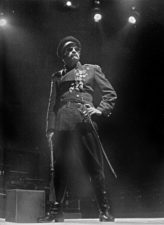
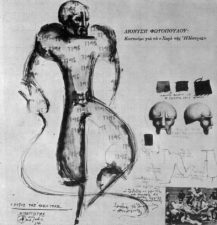
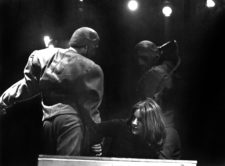
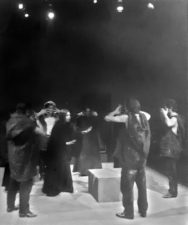
"Electra's Dance"
The play was written in Athens where as an employ of the Ministry of Interior she experienced the cruel reality of the military regime. It was a metaphor of the ancient tragedy, that directly opposed the dictatorship and submitted it to the National Theatre selection committee in Greece. The play was banned at first by the regime's censorship, but after repeated attempts it was staged under police surveillance and it had a great impact as an anti-regime statement.
Read more
In 1972 Maria was married to Minoas Pothos and they had a son, Emmanuel in 1973.
Memories become books
Before closing the chapter on the "Early Years" of her life, it must be said that the fear of the absurd regime she experienced during the dictatorship brought to life that old fear of her childhood in the German Occupation.
As she states in one of her interviews: “As a Child of the German Occupation, I experienced firsthand the fear of witnessing the absurdity of such a ruthless human extermination.
My childhood years marked my whole life and my work. The trauma, distorted by time and memory, by the myth of fantasy, I carry it in all my books. And most of all in my book "Nights of the Moon" which is my childhood during the Occupation through my dreams. Writing this book, I learned that surrealism is our daily life. We exist in parallel levels, in parallel realities where one emerges from the other, fragments of memory and dream, flashes from our lives.”
She has also said: "That same fear that I experienced as a child in the German occupation, resurfaced in the nightmares I experienced in the absurd military regime as if my old experiences were revived, living in a new psychic realm that was fractured inside me."
After the dictatorship
In 1973 she submitted her resignation to the Ministry in order to focus on her family and books. In 1976 she experienced the loss of her second child. Since then, through her books, she searched the metaphysical ways of truth and knowledge beyond conventional reality in order to achieve transcendence and enlightenment.
"Mystic Passage"
In 1989 she published one her most important collections of poetry, Mystic Passage. In France, this book was translated into French and prefaced by Jacque Lacarrière and published by Le Temps qu'il Fait in 1995. In Sweden, it was translated into Swedish and prefaced by Ingemar Rhedin and published by Bonniers in 1996. In the UK, it was translated in English by professor of classics Theony Condos with a preface by Apostolos Athanassakis and published in the New York university magazine, The charioteer, in 2002.
Read more
Samuel Beckett
Since the first letter she wrote to Samuel Beckett while in Paris in 1966, asking him to translate his play Happy Days. They started a correspondence that lasted until his death. In his letters he expressed the interest to personally meet. In 1971 Maria met Samuel Beckett and discussed her point of view regarding his theatrical work. At that meeting she presented to him the work she did in the Sorbonne with Bernard Dort and discussed her lecture on Beckett’s work, where she argued that his play Happy Days is a contemporary tragedy, in today's sense of the tragic, in opposition to the ancient one. According to her, his theatrical characters were not ‘bums’, in the way that the critics had characterized them, but instead closer to the meaning of the corresponding word in Empedocles phrase (“και εγώ νυν ειμί φυγάς θεόθεν και αλήτης”, Καθαρμοί Β115), where “bum” “αλήτης”, is the worldly wanderer. She also argued that his characters have pre-existing memories. After that meeting, Maria went on to write an essay titled “Samuel Beckett - The experience of the existential Grief,” which was published with a long preface by Jacques Lacarrière in 1980.
1st letter: When Samuel Beckett accepted the Nobel prize in 1969, he went to Palermo so as to avoid journalists. From there he sent this letter, in which he wrote: «Les livres ne m’arrivent pas dans mes errances». "Books do not occur to me in my wanderings". 2nd letter: «Les manuscrits affluent, le travail s’accumule la vue s’en va, le temps presse. J’espere avoir le plaisir de vous rencontrer a Paris un de ces jours. N’hesitez pas de me faire signe quand vous y passerez». The manuscripts multiply, the work accumulates, and the vision diminishes. I hope to have the pleasure to meet you in Paris one day. Do not hesitate to contact me when you visit.
Odysseus Elytis
From her early years in Lemnos, Odysseus Elytis was her favorite poet. While still living in the island, she published her first collection of poetry, Meetings, and it was Elytis who was first to recognize her as a fellow poet in a letter with a personal review of her poems. Maria had always admired his poetry and some years later in 1979, she was invited to make a presentation about him in the Aegean symposium for literature. Maria sent her presentation to Elytis, who encouraged her to continue her work on his poetry. For the next couple of years, she devoted her attention to his work which eventually led, with Elytis’s support, to the publication of her book Odysseus Elytis – A Vision of the World.The book was strongly influenced by the philosophy of the Ionian Pre-socratic visionaries and by Plato's “heaven memory” of the psyche, (“τούτο δε εστιν ανάμνησις εκείνων, α ποτ' είδεν ημών η ψυχή συμπορευθείσα θεώ”, Φαίδρος 249c). This work was a result of Maria's drive to transcend the darkness of western nihilism and the non-transcendent work of Beckett's writing.
Athens, 1982. In a reception hosted by the Athens Municipality. At around that time the book “Odysseus Elytis –A vision of the world” was about to get published. The book cover features a sketch by Picasso dedicated to Elytis. In one of his letters to M.L.P. he writes: “(...) At last after tons of critical nonsense, someone who understands what is being read. Bravo and bravo again. Complete your analysis, extend it and develop it with references to my other work too (with attention to the Open Letters) so that we can end up with a book that can guide the youth in terms of how to approach poetry. We will take care of this together when the time comes. For the time being, I sincerely thank you.”
Jacques Lacarrière
She was acquainted with Jacques Lacarrière in her first days in Paris where he helped her adjust. He had read her poetry and some of her books and introduced her to Bernard Dort, her professor in Sorbonne. During her studies in Paris they maintained contact and their friendship grew even when she returned to Greece. In later years their friendship evolved into a spiritual collaboration as Maria had reviewed his work in Greek newspapers and translated his poem The Charioteer in 1982. Later, along with Minoas Pothos, they translated Maria the Egyptian and Writing Path. In the summer of 1995, Jacques Lacarrière translated Maria's poetic collection Mystic Passage, aided by her consultation and published it at the Temp qu'il fait editions with a preface he wrote. In his book The Erotic Dictionary of Greece, he devoted several pages to Maria, where he praises their friendship and her work. several pages to Maria, where he praises their friendship and her work.
Preface by J. L. for Mystic Passage
“How beautiful are the poems in Mystic Passage. They have an intense light, a thick brightness, as if night became crystalline and trials sources of existence. A search of ultimate truth as if there is no shadow between the substantial and the words. Words are naked. Words are guides.”
Later years
1st photo: At the ancient theatre of Hephestia in Lemnos before the restoration. 2nd photo: At the First International Women Playwrights Conference, which was held in Buffalo, NY. 3rd photo: At the ceremony for the literary award from the Academy of Athens for the novel Maroula of Lemnos. 4th photo: At the theatre of Hayward university in California with the actors who performed at the play Antigone or the nostalgia of tragedy.
The books she wrote in her later years were the ones that were loved the most by her readers. One one side her historical epics, The City has been taken, has been taken (The last emperor of Byzantium) which is about the fall of Constantinople, The wooden wall, which illustrates the great battles of ancient Greece, Maroula of Lemnos, a medieval figure that resembles Joan of Arc etc. On the other hand her books of social and existential angst like the Angel of Ashes, The Sacred River, Moonlight and others. She has published numerous articles, critical reviews, and essays in literary journals and daily newspapers, (To Vima, Kathimerini , Eleutherotypia, Ethnos, Literature Issues) She has participated in many conferences in Greece and abroad. There have been honorary events for her literary works and recently in 2017 the municipality of her birthplace, Lemnos, has dedicated a hall in a restored mansion where it hosts her literary archive.
Selected bibliography
2020 Orpheus in the enchanted forest Those stories are variations of the wonderful traditional fables of greek folk tradition. Myths and fairytales enriched with the imagination that travels the child and the teenager into a world of magic and miracles. I recreated them, searching their inner beauty. Some of them were born from the stories i was telling to my son, when he was at the age of fairytale. Released in 2020
2019 The beating of your heart A tender and true story. A story that came into my life unexpectedly and opened luminous paths for my adolescent hero and myself as well, so that I too would search for the miracle and the magic behind some unexpected events. Released in 2019
2019 As a beautiful dead An elegy of separation, poetry dedicated to Minoas. Released in 2019
Memory is awakening, I told you
Remember
Remember me
When I saw you wearing it tight
freshly dug
To become one with it, like
A new destiny
All my days fought
With the Impossible, and you
Were standing sacred
On the ever flowing Heaven’s
Side
That is how, they say, soul unfolds
The ancient charriot
And through irises and mountain harebells
Through white sea breezes
Of another world
Took you where the vows of those who love
Become angels
and the water speaks
water like pearls, stand up high,
on mountains older than Time itself.
Remember me!
2019 The Angel of Ashes The novel continues the song of the dead brother, creating a new myth that reaches the Sanctuary of the Soul to complete its long journey to the underworld. A young man who is a thousand years old, a contemporary Orpheus, destroys Hades' abode and clashes with the Dark one to retrieve his beloved. An anarchist, captivating, bold novel that drives the Soul into the glade of the Great Truth. Released in 2001
2018 The Wooden Wall Through the eyes of a child from Lemnos, taken captive, the epic of the ancient world unfolds. Alkamenes manages to reach Sparta, and witness the events in the greatest war clashes in History, as a slave condemned to death, as an observer. The Wooden Wall, above all, is the human adventure, man itself. The epoch of his struggles, but also his perception of life and destiny, about death. Released in 2006
2018 The planet with the hanging houses These are three fairytales I used to tell my son when he was young. Three adventures. Three journeys with the skybucket, their magical spaceship. It is for children who are ready to travel with their most poetic imagination, but also to learn valuable things that will help them grow up.
2017 The City has been taken The novel brings to life the last days of the besieged Byzantine Empire. Minute by minute it records the fifty-seven days of the Capital's siege until its Fall. Positioned against history but also with responsibility for historical truth, the author portrays the ultimate struggle, the ultimate sacrifice, which became a milestone in the modern history of Hellenism and became a universal symbol. At the same time, it shows the shocking course of Byzantium's decline as well as the painful adventure of Hellenism after the disaster. Released in 1996
2016 Paths of my angel They are pages from the diaries I kept for a lifetime. Rainy landmarks lost in the haze and the designs of an ever-new book and poetic accounts of my life. In writing Paths of my angel, I learned that we have nothing of our own. Ours is only what we give.
2015 Samuel Beckett - The experience of existential grief I met Samuel Beckett when I was in Paris on a scholarship by the French Government and kept a long correspondence with him. I became a translator and scholar of his work. The book was released in 1983 with a foreword by French author Jacques Lacarrière.
2015 "Love me..." and other fairytales Three stories three magical trips to the land of Good. "Love me ...", "The little soldier and the little girl in the purple hat", "The stone tree and the swallow". The Stone Tree sent a message to the child with his talkative branch. You will think that something good will happen and you will be set free, it said... You will only think of the Good. You will call it with your mind. And something good will find you. "
2014 Interview with the swamp ghost A forgotten calendar and Time. A child manages to save the work of the Greek Counterintelligence. An English officer is killed but is still present. The supernatural power of an amber ball opens the secrets of time and brings the events of the German Occupation, as raw as the moment that gave birth to them. Because knowledge is power.
2013 Thirst burns me and I am lost The novel was written in the times of the great crisis and unfolds in the deserted streets of Athens, but also deeply in the mystery of love. The characters develop their own defense to escape their desolated reality. The book moves along the dark, Freudian paths: from Soul to Soul.
2013 Gratuitous autumns These are the interviews I gave for a lifetime when one of my new books was released. I called it my insight about the world and existence. Texts born out of a deeper need to see my books with the purity of another vision.
2012 And the abyss rose up to my knees My twelfth poetic collection. Poetry has always been for me the raw building material of my books, the metaphysical element of my vision.
I give back to you one by one the starlights
I was gifted
and those gratuitous autumns
the first rains of love
the view of the Unspoken
to you, Maria
from a desolated time
time consumed by the tears
and it shines upon the old heavens
2012 Miracles get angry when you don't believe in them Stories and testaments of the soul. The texts of this volume were written from Christmas to Christmas. What connects them is the miracle. The miracle that can stir the dark. To make the impossible possible. To make real what's not real. When injustice is abundant. To believe in the miracle is to challenge the Impossible.
2011 Grey city I started writing it in 1967 when I was studying in Paris. The novel takes place in the so-called sinful 60s, marred by international events of violence and anarchist romanticism. A fragile girl, broken by the memories of ruins - but also by the anarchist present, will find herself in the heart of Paris and live her own adventure, between the barricades of the Latin Quarter and the white islands of memory. Released in 1971
2011 Life, just for one day A love story that takes place in just one day. During this single day, the two lovers will live through the entire experience of their lives. Desire, anger, blood. So that they can feel the absolute love that cancels death.
2010 THEATRE I Four plays that have not been staged. But my life has become fragile and I wanted to give them a 'roof' so that the wind will not scatter them one day. Theatre exists only as poetry of passion, in a mysterious relationship with the poetry of our soul. I wish I had only written theatre.
2010 THEATRE II Completed version. Five plays, The Glass Box, The Rafts, Antigone or the Nostalgia of Tragedy, Bidding you farewell, Paper Moon. Each one has its own story of writing and performing. The first three were written in Paris. Released in 1998
2010 Natalia and Christina I tried to lead Natalia and Christina to a kind of self-analysis so that they could realize their mistakes and their power, and reach their inner truth, which means liberating themselves. Released in 1994, Also translated into English, it's available as an ebook by Amazon
2010 Hypsipyle the Queen of Blood The novel brings to life a legend thirty-three centuries old and is given through a series of rituals. Blood, mourning, grief, katharsis, and finally love which are the five cycles of the soul until it reaches the light. The passion of Lemnian women, which will lead to mass murder. Mourning, afterward. The agony. The katharsis. Finally, love, as a symbol of eternal beauty.
I love you and for you I will enter
with my lyre into death
and if the thirst, and if the pain burns me
in the thousands of years to come I can
like a star that lights your way
like a spring that blooms from you
sing to you
2009 Moonlight A Promethean novel. The innocent who meets fate and must confront it. At the risk of his life, a modern Prometheus will save an ancient relic, the Sacred Charter, where the secrets of genetic material are engraved which will redeem man from pain. A novel about "addiction to chaos" and social mercilessness.
2008 With the storm lamp A simple, everyday man, suddenly confronted with supernatural phenomena, is isolated on an island, trying to unravel the signs sent by the invisible world. There he will live a debauched life and the ultimate love, he will experience the inexplicable and the mysterious, which will lead him to self-knowledge. My first surrealistic novel. Released in 1993
2007 I gather my belongings Collective volume of eleven poetic collections. It is the path of my life through poetry. Nothing was more difficult for me than writing about my life. For the steps, that took me from one book to another. For the events that defined me, for the pain. Poetry has always been the raw building material of my novels.
TWELFTH PASSAGE
Of AbsenceIf you do not exist how can I contain you, said I
When my body strained under your weight
But now that time has emptied my flesh
And distance diminishes
I hear the night stir like a wild animal
A riddled shell and
Your absence flows
Like the whitenesss of the Angel that promises
Whispering paradises
I gather up the things I will take with me
Some birth-blood
Two drops of April from your eyes
And a knapsack of moon for the journey
I gather my belongings — baggage of “no value”
A naked rose containing the desert
And a fragrance of burning night
In the midst of the sea
And that poem unwritten
Because it is wordless
The ultimate banishment of Absence.
2003 Sacred River It is the unfathomable journey of the soul from the origins of myth to the present day. The path of the mythical and present Persephone, with the memory of Hades, who will meet on her way the Saint with the bloodied cloth. Sacred River is a magical journey to the unseen. The love of two people that will lead to the secrets of a another self-knowledge.
2002 Letter to my son and a star It consists of twenty-one Letters, broadcasted by the State Radio. As a radio show and as a book Letter to My Son and a Star was loved by thousands of children and adults. A tender book about the soul of a child, how it can be integrated into today's alienated and contradictory world. Released in 1982
2002 The anniversary of roses A novel about the most sacred time of woman, motherhood. For the woman herself, at the moment she realizes her power, her superiority. It is the realism of the cruelty of the modern world that conflicts with this poetic hour of woman: the birth of her child. Released in 1987 titled "Superiority"
2002 The vision of Alexis Feras On an isolated island in the 60s. A young girl seeks out her personal relationship with magic, the first knowledge. It is the dazzle and the revelation of the secrets the body carries. The first traumatic experience that will lead the heroine to maturity. Released in 1960
2000 Twilight of solitude Short stories that test man in the most exposed hour of his truth, in the twilight of his solitude. The book consists of two sections "Christmas short stories" and "Twilight of solitude", which are linked by loneliness and escape to the dreamy monologue. Released in 1991
2000 I am a weeping star Eleven theatrical monologues. They were presented at the Masks Theater in 1997-98. Lonely, everyday people experience a fragile reality, a need to flee from the uncertain present. Linked by solitude and the nostalgia of the lost.
1999 The sixth seal Supernatural phenomena occur in a small place, shortly before its destruction. Andrea, fascinated by the mystery surrounding this place, desperately tries to save it. But she can't. This novel is a reference to the irrational persistence for the planet's catastrophe. But also to the primal signs of the Apocalypse.
1999 Walking and dreaming These texts were broadcasted by the State Radio in 1987 and then became a book as poetic prose. Morning monologue and reflections on life and time, decay, the ephemeral and the eternal, on the search for the magic that is hidden.
1998 View towards the Unspoken Poetry dedicated to Mother. To the departed mother, the one who stood beside us as a shadow, to mother who sleeps alongside us in our dreams, and traversing the corridors of our soul carrying the memories of tender age.
Midnight is ready for some time
Light packages
Fragile
Full of Junes and illegible touches
Scent of home on a winter's day
With the angel behind the iconThe last movement of the hand slow
Its last solitude as
It is wrapped in the storm
An unbearable touch
As from a dead thunderbolt
Where are you going? Where will you go now?
The body bends and
bends like a prow
Like a thalassa stasimon
And the glance from a hail
That abolishes distances.
1995 My Asia Minor home It is a poetic approach to the House-Symbol, a reference to the sources and roots of that land that became the homeland of blood. Dedicated to my father from Asia Minor. Released in 1986
1995 On the wings of winds Poetry. "Rarely, these days, do we have the opportunity to enjoy such luminous lyrics that originate from the psalms, such words as "thunder and lightning", which keep the standard of the Bible's solemnity and brilliance of Revelation." A review from the poet Takis Varvitsiotis.
I asked nothing from your gifts
Only a handful of earth to stand
And a gust of spring to love
To fly away with the birds like youth
And with a full moon
An endless night in June
To roll again on pine needles
I asked for nothing
I only stood facing you
A rose sprang on the prophesy's rock
And on my clay the angel has blown thrice
The Notional Sun
To evangelize the Desert
1995 Body, remember not only how much you were loved Her: A struggling woman who shouted her ideas, lived the sacrifice, but also liberated herself. Him: The son of the old myth. The aristocratic lover. Both of them defeated by different paths, they will be granted the beauty, that only compassion gives to faces. A novel that carries the trauma from the memories of the Nazi occupation. Published in 1990.
1994 Odysseus Elytis, A vision of the world I based this work on the visions of pre-socratic philosophy. On Empedocles and Heraclitus. On the power of Anaxagoras' "Mind", which "transformed chaos into cosmos". I also based my work on Plato. The "Memory" of the lost heaven paved the way for me to proceed. It was written with Elytis' help. Released in 1981
1992 Nicephorus Fokas Triumphs and schemes in the Sacred Palace, lovers of the night, witches, ambitious power players lurking in the shadows. Nicephorus Fokas is the cruelest and most glorious general of the empire. The liberator of Crete. He lived divided between his oath to God and his love for the sinful Theophano.
1991 Answer to a letter and some guilt These texts were written for the State Radio and transmitted in 1982-83 in response to the countless letters I received from children and adults about the radio show Letter to My Son and a Star. The book is aimed at the teenager and his solitary relationship with the world, the agony of searching for himself.
1991 Maroula of Lemnos Middle Ages. Venetian domination. Poets and historians compare Maroula of Lemnos to Joan of Arc. History left us with very little evidence. I tried to retrieve her faded star from the centuries and create a fictional biography. The novel was loved by children and adults. Released in 1986
1990 Doxanio The story of a tender daughter from Lemnos. Around 963. She was taken as a slave to be sold to the city of Candia (Crete), but she manages to escape and become a spy for the emperor Nicephorus Fokas. She cooperates with him and rallies the terrified crypto-Christians. Along with Doxanio's legend, the novel brings to life that gloomy period of Byzantine history.
1989 Mystic Passage I believe that this is my most essential work. Blood poetry, i have called it "a naked rose to contain the desert". It consists of fourteen passages of matter and cosmic substance, existential passages, where the soul seeks its signs, to bring them along, these signs that the soul carries like heavenly memory in its worldly landscapes.
1984 Nights of the Moon Moments and events from my childhood during the Nazi Occupation that for decades have been transformed into dreams. In 1984, during the summer in Lemnos, I collected all these dreams and wrote a book to be free of them. Today I see all those experiences in the books I later wrote.
1984 Walking and dreaming The poetry of this collection has a little from all the books I wrote at the time. Or, the books came out of this poetry. The poet Hector Kaknavatos had written: “The poetic pulse of M.L.P. and its poetic version, concerning "Walking and dreaming", are signified by flow, a flow that is of Heraclitus, of Empedocles, a sail on worldly waters with a secret course from the map in Empedocles' "unusual space"
I am a landscape
From the blood of old sacrifice.Its morning and I walk on Palatino
Rocks and bricks
And a hand that escaped decay
Its morning and I walk on the Capitol
With Caligula erasing
Imaginary roads made out of fresco and stars.
Its morning and I walk in apheresis
In the absence of time
I am crossing through the layers of times
Dead cities and untouched graves
Shiny rocks where aching souls keep silentI cross through the memory of elements
The one engraved inside me
And I wake the vision of my hands
To touch
Like moon droplets
The passage.
1980 Orpheus in the enchanted forest Myths and fairy tales from our folk traditions. They are linked by the miracle and the pain of love that matures the spirit and tests the power of the soul. Furthermore, they are connected to the magic element that is the poetry of our whole folk tradition.
1979 The child was a star that faded away This poetic collection was written by M.L.P. to bid the child she lost farewell.
This letter is not the last
you will still be there, little child
There, deep in the crevice
between world and abyss
There in deep consciousness
Between wound and blood
you will still be there
Between the threshold of time that split in two
My existence
You and me
you will still be there as long as the vain and false
support the roots of this world
On top of the fierce night
Sweet angel
To the last knowledge
I am thankful for loving you
In death.
1975 In our Times of Betrayal Poems written in the difficult years of the Junta regime with the fear we experienced and the guilt of silence.
The blindfolded adolescent
with a well of bloodied spring on his temple
with a No in his last sun
Blood that flows under the flag
of the resistance
1973 The light of your face It is my purest poetry, the most meaningful. A "song of songs" the review called it. And it's dedicated to the birth of my child.
Where are you coming from
I didn't ask
Your memory sleeps in its infancy
But I know you bring centuries with you
Of Enlightment
That your hands touched
The annunciation of the world
And the knowledge written on your small existence
Visions and quintessence.
1969 Landscapes of Adolescence, Poems in the Latin Quarter I walk the Saint Michel boulevard, along the picturesque Seine, on the Rue des Feuillantines. In the rainy streets of Paris, I experience the desolate landscapes of my adolescence and this is the most magical sense I've ever felt. My lost time becomes endless poetry. "Time lost and won". Poems from the collection were read by students during the Junta regime at secret gatherings just before the uprising.
Talk, say something
Say words of love or remorse
The night surrounds us
It rises slowly on our lips
On our bones
And the door creaks from the wind and your silence Are you listening?
Only a cricket in the garden And ourselves
The noise stopped in the highway
A cricket and ourselves
Right in the heart of the world!
Us two and the heart of the world.
"Your body creaks like hot sand" you told me.
"Your body is the frontier of things" you told me.
Now as I look on your face
It is as if i never existed As if you never existed
The loneliness between us
Between the border of the heart and of things
The absence
And your clothes full of earth
Earth that smells of your body's sweatTalk Talk Say something then
Nothing nothing more rightfully ours
Than everything we lost forever.
1968 Paper faces The junta in its heyday. With fear seeping in through all the cracks like something out of Kafka's pages. It is the inability of the characters to live in a world that is irrational and hostile. Not because they are incapable out of personal guilt, but because the world in which they live in rejects them. But this consciousness of the Impossible is the strongest sense of existence.
1965 Small cage It was written in the troubled 60s. When we were trying to get out of the trauma of post-war adolescence. When the betrayed innocence and guilt of joy were upon us. With Sartre's denial and existential nihilism reaching the desolate rocks of my life. My handicapped hero will live through all these experiences.
1963 Small Worlds The adolescent times I used to recite Eliot's lyrics on the shores of Lemnos lead me to Small Worlds. His influence is obvious. But that doesn't seem to bother me. With this "Eliotic" poetical flow I bid farewell to what I lost, the magic of youth on the island. Or maybe, fearful of the reality I live in, I return there. I return with my poetry. A wrinkled poetry.
Every morning
The song of the dead brother
Will awaken you from the ashes.You never thought of the wound left behind us
That summer
The bird with the stone wings
And Seffe's boats moored in the beachfront of Chryse
wretched wood for the dead to travel
That summer the garden was full of tender birdsWhat where you looking for?
Our eyes full of extinguished candles
From days we didn't live
What where you doing on those rotten planks
That have never sailed?
1961 Study It is my initiation into the knowledge of pain and decay. Time becomes a tyrannical concept that digs deep into my soul. It becomes a new anxiety that I will call existential in later times.
When I enter my old house
The rooms fill with birds
And in the pots it's still fresh
The memory blooming with visions
Time locked in the drawers
Fragrant with oblivion
Broken candlewick
It stacks shadows on the scratched walls
It stacks silence on silence
Where I left your tender face
There is a wound from oblivion
Birds holding on their beaks
a piece of death
It's what is left from my old house
1959 Encounters I have said that I started with poetry and I know that only through poetry can I seek my intuition about the world and existence. It is my first poetic collection written when I was still living on the rocks of my island, or otherwise, “It's the First Hour. A magical - but also anxious - relationship with the world”.
Where can we find a sun for bandage
To dress the wounds
Philoctetes
(…)
Groans and wastes
Groan and pleading in the rock cave
Not even the spring of Lycian Apollo
Couldn't cool your burning
But your algos, wounded one,
Still carries away your moan
to the ruthlessness of the Achaeans
Carry away your loneliness
To the footsteps of man
And as the snake drags your figure
To the cave of the aeons
It wraps around its body the circle of human suffering
It wraps in its curse the voice
Of human injusticeAnd they hold out two hands on each pleading
your pleading
pressing two lips on each cry
your cry
In the wilderness
Your abandonment
Philoctetes!
